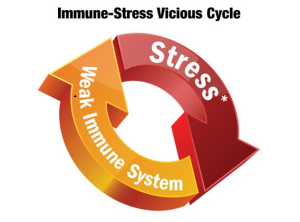Introduction
Have you ever wondered how stress or stressful conditions predispose you to illnesses and infections?
The body’s defense against illnesses, infections, organisms, and threats is the immune system. To protect healthy tissues, the immune system must recognize and eliminate dangerous invaders. However, this body’s defense system can be weakened by continuous stress, which increases your susceptibility to disease/invaders.

Credit: iStock/J Bettencourt/peopleimages
Living inevitably involves stress brought on by a variety of factors, including physical, emotional, or financial. The human body triggers the “fight-or-flight” reaction under stressful situations. Stress hormones like cortisol and adrenaline are released as a result of this. Although this reaction is necessary to survive in an emergency, prolonged stress might negatively impact your immune system.
When it concerns your health and well-being, Wellahealth remains committed to eliminating the stress involved in accessing wellness programs, preventive care, and mental health services that are crucial to you and your loved ones. This blog post aims to educate you on the link between stress and your general health and how you can effectively manage and eliminate stress.
Stress And The Immune System
There is a complicated relationship between stress and the immune system that involves both mental and physical reactions.

Credit: Diagnotechs
The effects of stress on the immune system include:
There is a complicated relationship between stress and the immune system that involves both mental and physical reactions. The effects of stress on the immune system are broken down as follows:
- Elevated Cortisol Levels
In a “fight-or-flight” reaction in stressful situations, the body releases stress hormones like cortisol and adrenaline preparing the body to deal with the impending threat. In the immediate stressful period, cortisol aids in immune response regulation and inflammation suppression. However, persistent stress causes the body to keep producing high amounts of cortisol and long-term exposure to cortisol inhibits immune system function, which makes it more difficult for the body to fight against diseases because there is a decline in the generation of lymphocytes, or white blood cells, which help to fight against infection.
- Prolonged State of Inflammation: Normally, the immune system’s reaction to an injury or illness involves inflammation. Even in the absence of an injury or infection, chronic stress can result in persistent low-grade inflammation. This ongoing inflammation can weaken the immune system, harm tissues and organs, and raise the chance of developing chronic diseases including diabetes, heart disease, and autoimmune disorders.
- Reduced Immune Cell Activity: The quantity and effectiveness of immune cells, including T-cells and B-cells, are impacted by stress. Immune cells are essential for identifying and eliminating foreign invaders like bacteria and viruses. T-cells and B-cells lose their effectiveness under prolonged stress, which causes the immune system to react more slowly. People may become more prone to infections and illnesses like the flu, the common cold, and even more serious conditions like tumours and auto-immune diseases.
- Decline in Healing and Tissue Repair: In addition to impairing the immune system’s capacity to combat infections, stress causes the body’s natural healing process to be slowed down. Research has indicated that those who are under prolonged stress have slower wound healing times. This is partially caused by decreased immune cell production and elevated cortisol levels, which hinder tissue healing and repair.
Stress Reduction and Management

Developing appropriate stress management techniques is crucial because of the potential effects that stress may have on the immune system and overall health. There are a few tips that can help you manage and eliminate stress to improve your health and well-being, these tips include:
- Increase Physical Activity: Regular exercise has been demonstrated to increase endorphins, the body’s natural mood enhancers, and decrease stress hormones like cortisol. In addition to enhancing immune function, exercise also fosters good circulation, which facilitates the faster passage of immune cells through the body.
- Get Enough Rest: An immune system in good health depends on sleep. The body heals itself and fortifies its defenses when humans sleep. Prolonged stress might cause sleep disorders, which can impair immunity. Aim for 7–9 hours of sleep each night to maintain a robust immune system and assist in stress management.
- Eat a Nutritional Balanced Diet: Immune system health is supported by a well-balanced diet high in fruits, vegetables, whole grains, and lean meats. Antioxidants, zinc, and foods high in vitamins C, D, and E can all strengthen the immune system. Reducing the amount of processed food and sugar consumed also helps the immune system and overall health, as consumption of processed foods predisposes an individual to chronic diseases like diabetes and hypertension.
- Build and Improve Relationships: Good social relationships can serve as a stress-reduction strategy. Participating in social activities or spending time with friends and family might help lessen anxiety and feelings of loneliness. In addition to being essential for mental health, social support can strengthen the immune system by reducing stress.
- Seek Professional Assistance: Consulting a mental health expert is necessary if stress becomes excessive or persistent.
Conclusion
Stress significantly impairs the immune system’s capacity to defend the body against sickness and injury. Prolonged stress can raise the risk of infections, and chronic illnesses through lowering immune cell function, and promoting inflammation. However, you can lessen the negative effects of stress and strengthen your immune systems by implementing effective stress management techniques, such as consistent exercise, restful sleep, a balanced diet, and improving your social currency.
Subscribing to an insurance plan can also help you manage stress as it enables you to gain access to wellness programs, preventive care, and mental health services that can be crucial in controlling your stress levels and preserving a strong immune system. To subscribe to Wellahealth’s affordable and accessible healthcare plan, contact WellaHealth today!
Article written by Dr. Ifeoma M. Uduh (BDS)
Edited by Dr. John Afam-Osemene (MBBS, DA)






